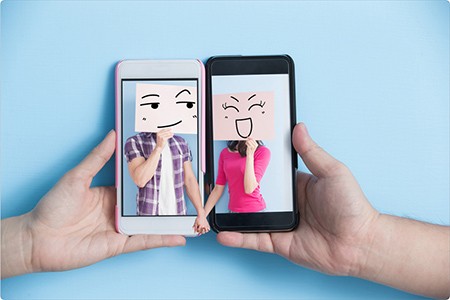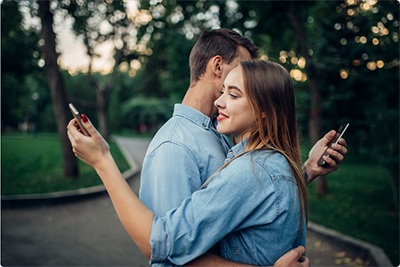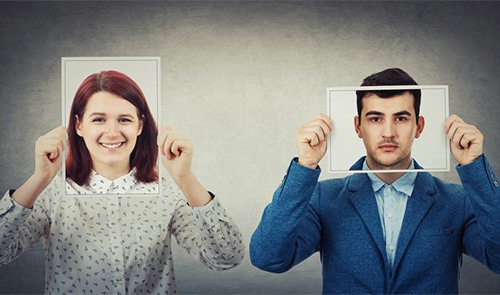In today’s hyper-connected world, social media has become an integral part of how we perceive ourselves and others, influencing our expectations in every area of life, including relationships.
Platforms like Instagram, TikTok, and Facebook are filled with curated versions of people’s lives. Glamorous photos, romantic gestures, and relationship goals present an idealized view that is far from the reality of everyday life.
This phenomenon has reshaped how we see dating, often creating unrealistic expectations that lead to disappointment, frustration, and a growing sense of inadequacy.
The influence of social media on dating is profound, with various studies and experts pointing towards a dramatic shift in how we experience romantic relationships.
Social media has not only influenced how we see relationships but also altered the very fabric of how people interact and communicate with their partners. The constant barrage of seemingly perfect moments can make individuals feel like their relationships are always lacking.
The pressure to measure up to these unattainable standards has led many to question the value of their relationships, even when they are fundamentally strong and fulfilling. In turn, this environment fosters an endless cycle of comparison, where people are more focused on external validation than on the genuine emotional connection they share with their partners.
The Rise of Dating Expectations And the Perfect Feed
With millions of users following influencers and celebrities whose lives seem perfect, it’s no surprise that these idealized depictions shape what people desire or expect from their own relationships.
The highlight reels posted by celebrities and influencers can create an illusion of relationships that are always exciting, problem-free, and filled with grand gestures.
This creates an unrealistic benchmark for what love and companionship should look like, leaving many feeling as though their own experiences are inadequate by comparison.
For example, a survey conducted by the American Psychological Association in 2021 found that 51% of social media users felt that their partners did not meet the “standard” set by the influencers they followed, which often led to tension and dissatisfaction.
It’s not uncommon for couples to find themselves comparing their daily lives to these filtered, edited, and highly curated portrayals, which can lead to dissatisfaction, even when their relationships are healthy and loving.
The pervasive nature of these portrayals often results in the unrealistic belief that relationships should always be filled with romance, adventure, and grand gestures. The reality is that real relationships involve mundane, everyday activities, and the effort to maintain emotional closeness through life’s ups and downs.
This discrepancy between perception and reality leads to a growing number of individuals feeling disillusioned about what constitutes a successful and loving relationship.
Couples who might otherwise be happy find themselves feeling like they fall short simply because their lives do not resemble those of influencers or celebrities.
Numbers Don’t Lie – The Data Behind Social Media’s Impact
 The impact of social media on dating is quantifiable and undeniable.
The impact of social media on dating is quantifiable and undeniable.
According to a 2022 report by Pew Research Center, about 45% of young adults admitted that social media plays a significant role in their relationship decision-making.
A study published by the Journal of Social and Personal Relationships found that people who frequently use social media were more likely to have an unrealistic outlook on love. These beliefs included expecting constant attention, thinking that love will always feel “new,” and believing that their partners must meet all of their needs.
Specifically, 68% of participants reported that their expectations for romance were influenced by social media content.
The influence of social media extends beyond expectations; it has also changed how people communicate within relationships.
A significant number of couples now rely on public displays of affection on social media to validate their relationship status.
This validation often becomes a substitute for real, intimate communication, leading to weakened emotional bonds. In a 2023 survey by the Gottman Institute, 59% of respondents indicated that they felt disconnected from their partners despite frequent social media interactions, highlighting the paradox of digital connectivity versus emotional intimacy.
Curated Reality vs. Real Life: The Dangerous Disconnect
Social media platforms are built on curation—users select the moments they want to share and often enhance them with filters and editing tools.
For example, people frequently post vacation photos, engagements, or lavish celebrations, which create an impression that these moments are the norm. This selective sharing leads to a “highlight reel” effect, where only the most picture-perfect, exciting, and romantic moments are shown to the public.
In 2021, a study by the American Psychological Association found that frequent exposure to idealized relationships on social media led to “relationship anxiety” in 54% of individuals aged 18 to 34.
A 2022 survey by OnePoll found that 60% of respondents felt pressured to create “Instagram-worthy moments” in their own relationships, such as elaborate proposals, vacation photos, and public displays of affection.
 This disconnect between curated reality and everyday life is at the core of the growing dissatisfaction many people feel in their relationships.
This disconnect between curated reality and everyday life is at the core of the growing dissatisfaction many people feel in their relationships.
It is not just about the glamorous photos or the lavish vacations but also about how these curated moments are perceived as the benchmark for success in relationships.
The constant need to present a perfect image on social media can lead to feelings of failure when the everyday realities of life do not measure up. This pressure can cause individuals to lose sight of what truly matters in a relationship—emotional support, shared values, and resilience through challenging times.
Impact on Mental Health and Relationship Satisfaction
The implications of these unrealistic expectations are serious. Relationship satisfaction has taken a significant hit due to social media, particularly among young adults.
A 2023 study by the National Institute of Mental Health revealed that individuals who regularly compared their relationships to those they saw on social media were 52% more likely to experience symptoms of anxiety or depression.
Mental health professionals have also noted a rise in cases of social media-induced relationship anxiety. In counseling sessions, individuals frequently report feeling inadequate or worried that their relationships are not “good enough” compared to what they see online. This can result in constant arguments, unrealistic demands on partners, and an overall decline in relationship quality.
Counselors emphasize that learning to disconnect from social media and focusing on direct, honest communication is key to overcoming these challenges.
In a study conducted by the University of Toronto in 2022, it was found that couples who frequently used social media to post about their relationship were often more insecure about the quality of their bond.
This need for external validation often masks underlying insecurities and weakens the foundation of a healthy relationship. The pressure to continuously present a perfect relationship online can lead to increased stress and reduced satisfaction, as individuals struggle to maintain appearances rather than nurturing genuine intimacy.
The Role of Influencers and Celebrity Couples
One of the most significant contributors to unrealistic dating expectations is the rise of social media influencers and celebrity couples. Their relationships often seem flawless, filled with luxury vacations, designer gifts, and grand gestures that are unattainable for most people.
These posts garner millions of likes and positive comments, reinforcing the idea that this is what a “perfect” relationship looks like.
A 2022 survey by Influencer Marketing Hub revealed that 47% of respondents believed influencer relationships were “ideal.”
However, it’s important to note that influencers are often monetizing their relationships; the vacations, gifts, and experiences are frequently sponsored content designed to generate engagement. This transactional aspect is often hidden from viewers, making it difficult for people to understand the real motivations behind these seemingly perfect relationships.
The commodification of relationships by influencers has profound implications for how people perceive love and commitment. Influencer relationships are often carefully crafted to generate maximum engagement, which means focusing on visual appeal and dramatic moments.
This focus leaves out the day-to-day realities of maintaining a healthy partnership—compromise, patience, and dealing with the challenges that come with real life. As a result, many individuals are left with an incomplete understanding of what true love looks like, causing dissatisfaction and confusion in their own romantic endeavors.
How to Counteract the Unrealistic Expectations
 The first step towards breaking free from the delusion that social media creates around relationships is awareness.
The first step towards breaking free from the delusion that social media creates around relationships is awareness.
It is crucial to remember that relationships are complex, involving both joyful moments and challenges—the latter of which are seldom posted online.
Digital detoxes can provide the space needed to reconnect with one’s partner without the influence of external expectations.
A 2023 study by the Digital Wellness Institute found that people who reduced their social media use by just 30 minutes a day reported a 23% increase in relationship satisfaction after one month.
Taking time away from social media helps individuals focus more on their partners and the positive aspects of their relationships rather than on external comparisons. Building healthier habits around social media usage, such as setting boundaries and prioritizing face-to-face interactions, can also foster deeper emotional connections.
For those looking to gain a better perspective on relationship dynamics, our male dating delusion calculator and the female delusional calculator at DelusionCalculator.co can offer valuable insights. These tools help individuals understand unrealistic expectations and foster a more balanced view of relationships.
A Reality Check on Love in the Age of Social Media
The key is to remember that real relationships are not defined by “Instagram-worthy” moments or grand gestures.
They are defined by communication, trust, support, and love—qualities that cannot be accurately captured by a photo or a post.
By becoming more mindful of how social media shapes our perceptions, taking breaks to reconnect with reality, and prioritizing genuine, offline connection, we can foster healthier, more satisfying relationships.
It’s time for a reality check: love isn’t always about perfect sunsets and designer gifts—it’s about finding joy in the ordinary, supporting one another through the tough times, and building a life together that’s real, even if it’s not picture-perfect. True love is about being present in the moment, embracing each other’s imperfections, and finding strength in the shared journey of life.
By focusing on what truly matters and letting go of unrealistic social media standards, we can cultivate relationships that are resilient, fulfilling, and deeply authentic.
